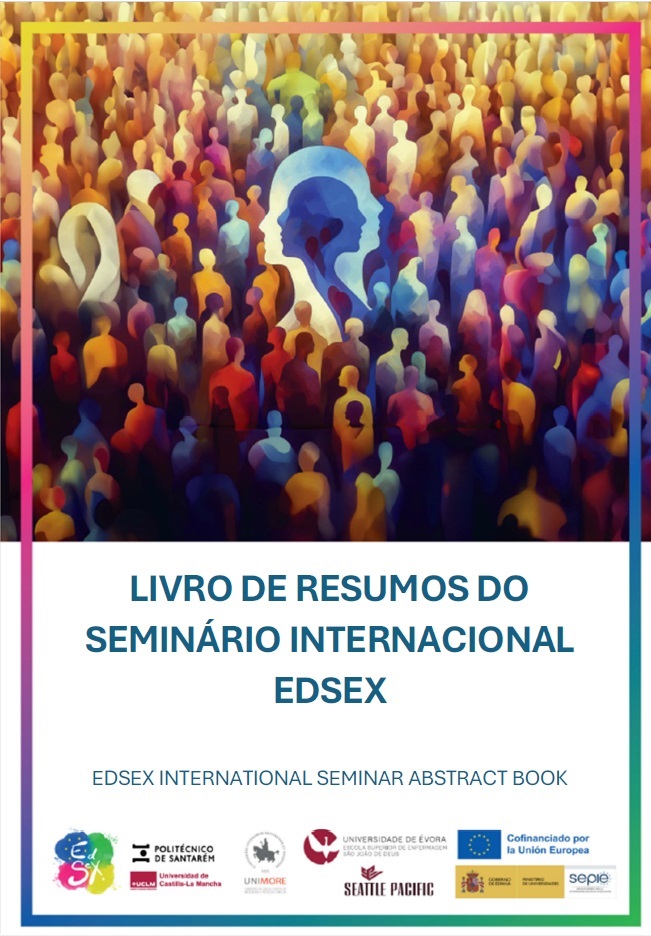EDSEX ABSTRACT BOOK OF INTERNATIONAL SEMINAR
DOI:
https://doi.org/10.25746/ruiips.v12.i2.36948Keywords:
Seminar, EdsexAbstract
International Seminar on Sexual Education: Promoting European Health
The International Seminar on Sexual Education: Promoting European Health, part of the EdSeX Project (reference 2021-1-ES01-KA220-HED-000023306), resulting from the Consortium between the University of Castilla-La Mancha, Spain (Promoter); University of Modena and Reggio Emilia, Italy; University of Évora and the Polytechnic Institute of Santarém, Portugal, and Seattle Pacific University as an invited entity, took place on the 18th and 19th of June at the Higher School of Health of the Polytechnic Institute of Santarém and gathered over three hundred participants both in person and online.
This Seminar constituted a space for discussion and sharing on the relevance of sexual education, where higher education has the responsibility to develop a transformative education that simultaneously produces, shares, and implements the best evidence to improve the health of individuals and the communities where they live and interact. The objectives were: to share the results of the EdSeX Project with the wider community; to foster intercultural contact among students, teachers, education professionals, health professionals, and the community; and to reflect on transformative education in the field of sexual education.
The Seminar featured the participation of various national and international speakers and researchers in the field, with a programme that included lectures, round tables, and sessions of free communications and posters, around eight thematic axes: I. Sexuality as a dimension of the human being, II. Sexual education throughout the life cycle, III. Sexual education/sexuality and cultural diversity, IV. Innovative pedagogical models of sexual education, V. Health literacy and sexual education, VI. Technology and innovation in sexual education, VII. Healthcare, sexuality and sexual education, and VIII. A transformative vision of sexual education.
Among the fifty-six presented works, noteworthy themes include:
- Sexuality throughout the life cycle;
- Sexual education in children, adolescents, and higher education students;
- Sexuality in young people with special health needs;
- Childhood sexuality;
- Child abuse;
- Fetal loss;
- Abortion (both spontaneous and by choice of the woman);
- Sexually transmitted infections;
- Climacteric;
- Birth preparation;
- Sexual desire;
- Postpartum sexuality;
- Infertility;
- Sexuality and pathologies (diabetes, HIV, endometriosis, psychiatric, and gynaecological oncology);
- Contraceptive counselling;
- Female genital mutilation;
- Culturally sensitive care.
In summary, the objectives of the Seminar were achieved, corroborating the social responsibility dimension of Higher Education Institutions, reinforced by the Sustainable Development Goals (SDGs) addressed by the programme: SDG 1 - No Poverty, SDG 3 - Good Health and Well-being, SDG 4 - Quality Education, and SDG 5 - Gender Equality. Additionally, the Seminar encompassed a multidisciplinary approach to sexuality directed at young people, women, and migrants, aiming to promote sexual and reproductive health from a transcultural perspective, respecting human rights, advocating for education for gender equality, and understanding and integrating sociocultural, historical, and political dimensions. Ultimately, it committed to a teaching and learning process of sexuality in the health field.
This thematic edition is illustrative of these assumptions.
Thank you all for your participation and interest.
Hélia Dias

Downloads
Published
How to Cite
Issue
Section
License
Copyright (c) 2024 Journal

This work is licensed under a Creative Commons Attribution-NonCommercial-NoDerivatives 4.0 International License.
Authors publishing in this journal agree to the following terms:
Authors retain copyright and grant the journal the right of first publication, with the article simultaneously licensed under the Creative Commons Attribution License that allows sharing of the work with acknowledgement of authorship and initial publication in this journal.
Authors are permitted to enter into additional contracts separately for non-exclusive distribution of the version of the article published in this journal (e.g., publish in an institutional repository or as a book chapter), with acknowledgment of authorship and initial publication in this journal.
Authors have permission and are encouraged to publish and distribute their work online (e.g., in institutional repositories or on their personal webpage) at any point before or during the editorial process, as this may generate productive changes, as well as increase the impact and citation of the published work.


